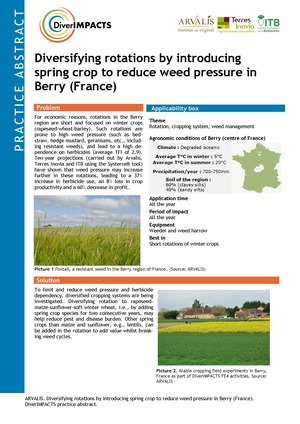Diversifying rotations by introducing spring crop to reduce weed pressure in Berry (France)
Authors: Clotilde Toque, Gilles Sauzet, Edouard Baranger, Peio Bachelet Piris
Problem: For economic reasons, rotations in the Berry region are short and focused on winter crops (rapeseed-wheat-barley). Such rotations are prone to high weed pressure (such as bedstraw, hedge mustard, geraniums, etc., including resistant weeds), and lead to a high dependence on herbicides (average TFI of 2.9). Ten-year projections (carried out by Arvalis, Terres Inovia and ITB using the Systerre® tool) have shown that weed pressure may increase further in these rotations, leading to a 37% increase in herbicide use, an 8% loss in crop productivity and a 60% decrease in profit.
Solution: To limit and reduce weed pressure and herbicide dependency, diversified cropping systems are being investigated. Diversifying rotation to rapeseed-maize-sunflower-soft winter wheat, i.e., by adding spring crop species for two consecutive years, may help reduce pest and disease burden. Other spring crops than maize and sunflower, e.g., lentils, can be added in the rotation to add value whilst breaking weed cycles.
English:
zenodo.org: Diversifying rotations by introducing spring crop to reduce weed pressure in Berry (France)
French:
zenodo.org: Diversifier les rotations en introduisant une culture de printemps pour réduire la pression adventice dans le Berry

 tap and then scroll down to the Add to Home Screen command.
tap and then scroll down to the Add to Home Screen command.